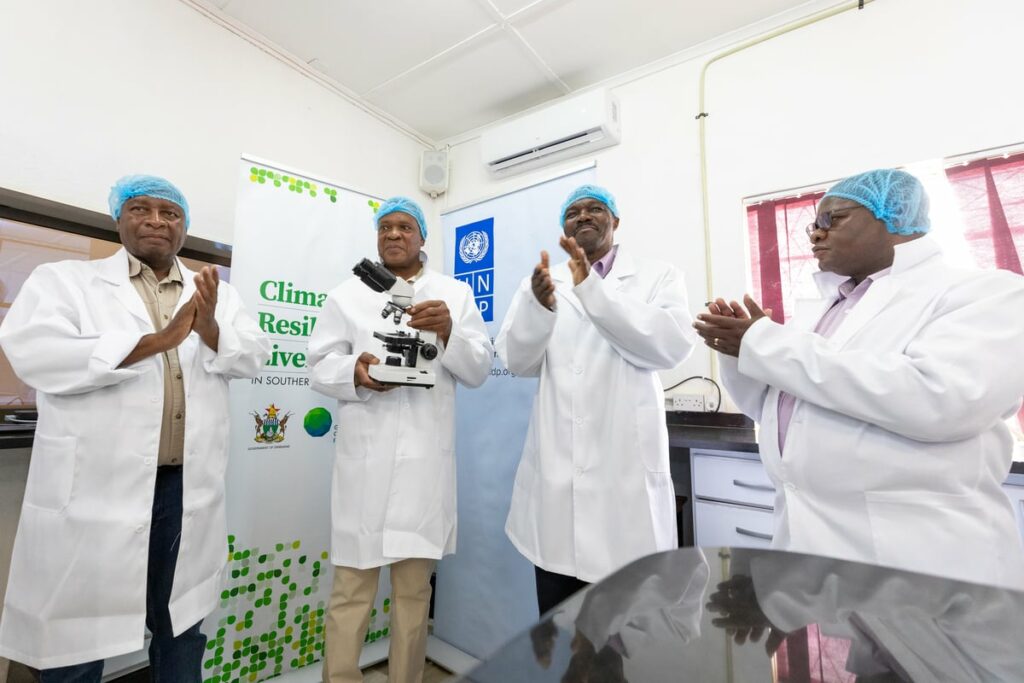The Government of Zimbabwe, in collaboration with the United Nations Development Programme (UNDP), has commissioned the largest livestock semen processing and cryopreservation centre in Zimbabwe at Matopos Research Institute.
Matopos Research Institute is one of the five innovation platforms established by the Climate Resilient Livelihoods project to promote adoption of climate-smart agriculture technologies in the country.
The Climate Resilient Livelihoods projects is a seven-year initiative, from 2020-2027, that seeks to help vulnerable communities, especially women, in southern Zimbabwe to cope with the effects of climate change on their agricultural livelihoods by overcoming technical, financial and capacity barriers they face.
The state-of-the-art gene bank equipment, valued at over $400,000 was commissioned by Anxious Masuka, Minister of Land, Agriculture, Fisheries, Water and Rural Development.
The centre, the second largest in Southern Africa, has a capacity to process three million livestock semen straws per year.
The cattle semen processing and preservation centre will play a crucial role in preserving genetic diversity through cryopreservation of semen from valuable livestock breeds, including indigenous and locally adapted breeds.
Matopos Research Institute is a custodian of Zimbabwe’s indigenous breeds (Tuli, Mashona, Afrikander and Nkone) and is availing these elite indigenous animal genetic resources to farmers at an affordable, cost recovery basis.
Masuka noted this milestone as a giant step towards attaining food security in Zimbabwe. “This centre is among the ministry’s efforts towards attainment of the Agriculture Food Systems and Rural Transformation Strategy, which seeks to increase agricultural productivity for national food security and food sovereignty, regardless of the weather,” he said.
UNDP Representative in Zimbabwe, Ayodele Odusola, said that the partnership strengethens Zimbabwe’s national climate resilience agenda. Like much of sub-Saharan Africa, Zimbabwe faces recurring climatic shocks that severely impact smallholder rain-fed agriculture, with far-reaching consequences for socio-economic development, he added.
The support, he believed, will complement the government of Zimbabwe’s thrust to achieve the climate adaptation milestones as outlined in the country’s revised Nationally Determined Contributions.
In addition to the livestock semen processing and cryopreservation centre, the innovation platform is focused on improving access to livestock nutrition through fodder production, feed formulation and agroforestry and on production and multiplication of traditional seed.
It is funded by the Green Climate Fund (GCF), co-funded and implemented by the Government of Zimbabwe, and managed by UNDP.
Zimbabwe’s Agricultural Livestock Growth Plan, according to Odusola, focuses on building and growing the national livestock herd, which is largely dominated by smallholder farmers.
He said the project is coming in to support the plan by ensuring every farmer can easily access affordable and high-quality cattle breeds. “This gene bank, through the support from the project, shall be promoting the production and adoption of indigenous livestock breeds that are adaptable and climate resilient,” he said.
State-of-the-art semen processing and cryopreservation equipment worth $394,390 have been procured from Germany and the Netherlands to equip Matopos Innovation Platform.
An additional $40,000 was invested for capacity building of Innovation Platform staff on artificial insemination learning from experiences in Kenya and towards procurement of other key machinery for the supplementary strategies that the Innovation Centre is implementing. The total investment of the project is $434,390.
The Matopos Innovation centre has been set up to promote the adoption of Climate Smart Agriculture technologies that address critical needs of vulnerable smallholder farmers who experience increasing climatic disturbances.
The Innovation Centre is expected to play a significant role by utilising the equipment to implement both in-situ and ex-situ livestock breeding and breed conservation strategies through cryopreservation of semen from valuable livestock breeds, including our indigenous and locally adapted breeds.
Odusola said that the partnership advances the national climate resilience building agenda where Zimbabwe, like most parts of sub-Saharan Africa, is perennially affected by climatic shocks heavily impacting heavily smallholder rain-fed agricultural production systems, often with severe extending consequences on socio-economic development.
The Innovation Platforms have been established to facilitate a transformative shift from subsistence-oriented farming to climate-resilient commercial-oriented livelihoods of smallholders.
The platforms are intended to address barriers of limited access to knowledge, markets and value chains by building and coordinating ongoing public and private sector support to climate-resilient smallholder production, value chain coordination and market access.
Source link : https://www.downtoearth.org.in/africa/zimbabwe-to-get-its-largest-livestock-semen-processing-laboratory-will-help-farmers-adapt-to-climate-change
Author :
Publish date : 2024-10-24 11:15:43
Copyright for syndicated content belongs to the linked Source.
